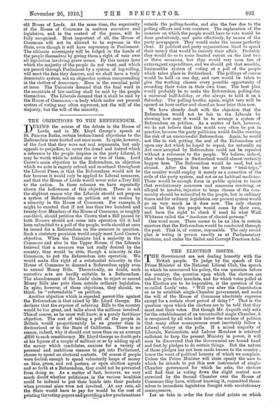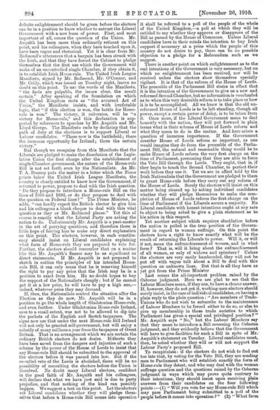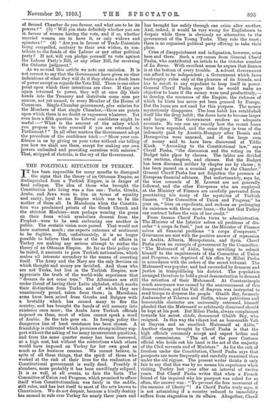THE ELECTION ISSUES. T HE Government are not dealing honestly with
the British people. To judge by the speech of the Prime Minister at the National Liberal Club, the speech in which he announced his policy, the one question before the country, the question upon which the electors are asked to give their mandate, and. for which votes polled at the Election are to be imperative, is the question of the so-called Lords' veto. "Will you alter the Constitution so as to establish single-Chamber government, and make the will of the House of Commons absolutely supreme except for a certain short period of delay ? " That is the question upon which the electors are to be told that they must cast their votes. But though Mr. Asquith only asks for the establishment of an uncontrolled single Chamber, it is recognised by all who look below the surface of politics that many other consequences must inevitably follow a Liberal victory at the polls. If a mixed majority of Liberals, Nationalists, and Labour Members is returned sufficient to keep the present Ministry in power, it will soon be discovered that the Government are bound hand and foot by pledges to do certain things. But the nature of those pledges has not been made known to the country ; hence the want of political honesty of which we complain. Unless the Prime Minister will state openly the uses to which he intends to put this new instrument of single- Chamber government for which he asks, the electors will find that in voting down the slight control now exercised by the Second Chamber over the House of Commons they have, without knowing it, committed them- selves to immediate legislation fraught with revolutionary consequences. Let us take in order the four chief points on which definite enlightenment should be given before the electors can be in a position to know whether to entrust the Liberal Government with a new lease of power. First, and most important of all, comes the question of the 'Union. Mr. Asquith has been more than ordinarily reticent on this point, and his colleagues, when they have touched upon it, have been vague and rhetorical. Yet it is clear from Mr. Redmond's utterances that a bargain has been struck with the Irish, and that they have forced the Cabinet to pledge themselves that the first use which the Government will make of an uncontrolled single Chamber, if they obtain it, is to establish Irish Home-rule. The United Irish League Manifesto, signed by Mr. Redmond, Mr. O'Connor, and Mr. Crilly, which was issued on Tuesday night, leaves no doubt on this point. To use the words of the Manifesto, "the facts are palpable, the issues clear, the result certain." After speaking of the foundation on which the United Kingdom rests as "the accursed Act of Union," the Manifesto insists, and with irrefutable logic, that "if this election is won, the battle for Home- rule is won." The victory, it reiterates, will be "a victory for Home-rule," and this declaration is sup- ported by references to speeches by Mr. Asquith and Mr. Lloyd George. The Manifesto ends by declaring that the path of duty at the elections is to support Liberal or Labour candidates. "There now is the battlefield ; there the immense opportunity for Ireland; there the certain victory."
But though we recognise from this Manifesto that the Liberals are pledged to make the dissolution of the Legis- lative Union the first charge after the establishment of single-Chamber government, the nature of the Home-rule Bill is not set forth even by the Nationalists. As Mr. T. A. Brassey puts the matter in a letter which the Times prints below the United Irish League Manifesto, the country is clearly entitled to know how the Governraent, if returned to power, propose to deal with the Irish question. "Do they propose to introduce a Home-rule Bill on the lines of 1886 and 1893, or do they propose to deal with the question on Federal lines ? " The Prime Minister, he adds, "can hardly expect the British elector to give him and his colleagues a blank cheque to deal with this vital question as they or Mr. Redmond please." Yet this of course is exactly what the Liberal Party are asking the nation to do. Unfortunately Mr. Asquith is a past-master in the art of parrying questions, and therefore there is little hope of fording him to make any direct explanation on this point. The electors, however, in each constitu- ency should insist on Liberal candidates explaining what form of Home-rule they are prepared to vote for. Further, the electors should remember that on a matter like this Mr. Asquith's finesse may be as significant as direct statements. If Mr. Asquith is not prepared to sketch in outline the principles of his intended Home- rule Bill, it can only mean that he is reserving himself the right to pay any price that the Irish may be in a position to exact from him. He no doubt hopes to buy the support of the Nationalists cheaply ; but if he cannot get it at a low price, he will have to pay a high one,— indeed, whatever price they may demand.
If, then, the Nationalists control the situation after the Election as they do now, Mr. Asquith will be in a position to go the whole length of Gladstonian Home-rule, and even further. Under Gladstonian Home-rule Ireland, save to a small extent, was not to be allowed to dip into the pockets of the English and Scotch taxpayers. The signs now are that under the next Home-rule Bill Ireland will not only be granted self-government, but will enjoy a subsidy of many millions a. year from the taxpayers of Great Britain. That is an arrangement which we are certain the ordinary British electors do not desire. Hitherto they have been saved from the dangers and injustice of such a scheme by the power of the House of Lords to insist that any Home-rule Bill should be submitted to the approval of the electors before it was passed into law. But if the so-called veto of the Lords is abolished, there will be no possibility of consulting the electors before the Union is dissolved. No doubt many Liberal electors, confident in the good faith of Mr. Asquith and his colleagues, will declare that what we have just said is due to party prejudice, and that nothing of the kind can possibly happen. We suggest a test on this point. Let the electors ask Liberal candidates whether they will pledge them- selves that before a Home-rule Bill comes into operation it shall be referred to a poll of the people of the whole of the United Kingdom,—a poll at which they will be entitled to say whether they approve or disapprove of the Bill as passed by the House of Commons. Unless liberal candidates have in their minds the intention to buy Irish support if necessary at a price which the people of this country do not desire to pay, there can be no possible objection to a pledge for a Referendum such as we suggest.
There is another point on which enlightenment as to the real intentions of the Government is very necessary, but on which no enlightenment has been received, nor will be received unless the electors show themselves specially vigilant. It is that of the reform of the House of Lords. The preamble of the Parliament Bill states in effect that it is the intention of the Government to give us a new and reformed Second Chamber, but no information is vouchsafed as to when this very desirable reform is to take place or how it is to be accomplished. All we know is that the old un- reformed House of Lords is to be left standing, though all power, except a certain power of delay, is to be taken from it. Once more, if the Liberal Government mean to deal honestly with the nation, they will put forward in plain terms what is their scheme of House of Lords reform and what they mean to do in the matter. And here arises a. question of immense importance. If the Government consider House of Lords reform so important, as one would imagine they do from the preamble of the Parlia- ment Bill, the natural and reasonable thing would be to make House of Lords reform the very first charge on the time of Parliament, presuming that they are able to force the Veto Bill through the Lords. They ought, that is, if they begin to touch the Second Chamber, to perfect their work before they use it. Yet we are in effect told by the Irish Nationalists that the Government are pledged to them to grant Home-rule before they -carry out any reform of the House of Lords. Surely the electors will insist on this matter being cleared up by asking individual candidates whether they will pledge themselves to make the com- pletion of House of Lords reform the first charge on the time of Parliament if the Liberals secure a majority. No Liberal candidate with honest intentions ought at any rate to object to being asked to give a plain statement as to his action in this respect. Yet another subject which requires elucidation before the nation is polled is the true position of the Govern- ment in regard to woman suffrage. On this point the electors have a right to know exactly what will be the result of returning the Liberals to power. Will it, or will- it not, mean the enfranchisement of women, and in what form ? That is, will it bring about the enfranchisement of all women, or only of widows and spinsters ? Unless the electors are very easily bamboozled, they will not be put off with vague talk about a Bill to deal with this question on unknown lines. But that is all they have as yet got from the Prime Minister Last comes the all-important problem raised by the Osborne judgment Here we are glad to see that the Labour Members mean, if they can, to have a clearer answer. If, however, they do not get it, working-men electors should surely insist, in the case of individual candidates, on having a plain reply to the plain question : "Are members of Trade- Unions who do not wish to subscribe to the maintenance of Labour Members to be forced either to do so, or else to give up membership in those trade societies to which - Parliament has given a special and, privileged position?" Mr. Asquith says "No," but the Labour Members say that they mean to introduce a Bill reversing the Osborne judgment, and they evidently believe that the Government will have to give facilities for such a Bill in spite of Mr., Asquith's statement on Tuesday. Liberal candidates must, then, be asked whether they will or will not support the Labour Party's proposed Bill. To recapitulate : if the electors do not wish to find out too late that, by voting for the Veto Bill, they are sending men to Parliament who will establish exactly the form of Home-rule they detest, and who may deal with the woman . suffrage question and the questions raised by the Osborne judgment in ways which may prove quite contrary to their intentions, they should insist upon receiving plain answers from their candidates on the four following. points :—(1) "Will you vote for any Home-rule Bill which may pass Parliament being submitted to a poll of the people before it comes into operation ?" (2) "What form of Second Chamber do you favour, and what are to be its powers ? " (3) "Will you state definitely whether you are in favour of women having the vote, and if so, whether married women are to have it, or only widows and spinsters ?" (4) "Are you in favour of Trade-Unionists being compelled, contrary to their own wishes, to con- tribute to the funds of the Labour or any other political party ? If not, will you pledge yourself to vote against the Labour Party's Bill, or any other Bill, for reversing the Osborne judgment." As we re-read this article we note one omission. It is not correct to say that the Government have given no clear indications of what they will do if they obtain a fresh lease of power except as regards the Veto Bill. There is one other point upon which their intentions are clear. If they are again returned to power, they will at once dip their hands into the Treasury and distribute some sum per annum, not yet named, to every Member of the House of Commons. Single-Chamber government, plus salaries for the Members of that single Chamber,—these are points upon which there is no doubt or vagueness whatever. Yet even here a fifth question to Liberal candidates might be useful :—" What is the amount of the salary which you propose to vote yourself if you are returned to Parliament ? " In all other matters the Government adopt the procedure of the confidence trick :—" Show your con- fidence in us by giving us your votes without our telling you how we shall use them, except for making our own powers unlimited and providing ourselves with salaries." That, stripped of rhetoric, is the cry of the Government.




















































 Previous page
Previous page